Associations to the word «Lightning»
Noun
- Flash
- Thunder
- Mcqueen
- Rapidity
- Bolt
- Rod
- Flare
- Cloud
- Rain
- Storm
- Sky
- Strike
- Flame
- Tampa
- Mater
- Thunderstorm
- Radiator
- Lightning
- Thunderbolt
- Leiden
- Clap
- Hopkins
- Tempest
- Torrent
- Flicker
- Zeus
- Cars
- Wildfire
- Hail
- Glare
- Fireball
- Steeple
- Dazzling
- Reflex
- Rumble
- Crunch
- Raider
- Streak
- Voltage
- Discharge
- Rainbow
- Thunderbird
- Spark
- Jove
- Gleam
- Spire
- Blitz
- Blackness
- Indra
- Keynes
- Bay
- Stroke
- Sprite
- Tesla
- Blaze
- Blast
- Protection
- Electricity
- Bruin
- Canuck
- Radiance
- Meteor
Adjective
Pictures for the word «Lightning»
Wiktionary
LIGHTNING, noun. A flash of light produced by short-duration, high-voltage discharge of electricity within a cloud, between clouds, or between a cloud and the earth.
LIGHTNING, noun. A discharge of this kind.
LIGHTNING, noun. (figuratively) Anything that moves very fast.
LIGHTNING, noun. The act of making bright, or the state of being made bright; enlightenment; brightening, as of the mental powers.
LIGHTNING, adjective. Extremely fast or sudden.
LIGHTNING, adjective. Moving at the speed of lightning.
LIGHTNING, verb. (impersonal) (childish or nonstandard) To produce lightning.
LIGHTNING ARRESTER, noun. A device used on electrical and telecommunications systems to protect the insulation and conductors from the damaging effects of lightning. Typically, it has a high-voltage terminal and a ground terminal. When a surge travels along the power line to the arrester, the current from the surge is diverted through the arrester, in most cases to earth.
LIGHTNING ARRESTERS, noun. Plural of lightning arrester
LIGHTNING BIRD, noun. A mythological creature in South African tribal folklore: a large, vampiric, black and white bird that can summon thunder and lightning and is said to consume blood and to seduce women in the form of a man.
LIGHTNING BIRDS, noun. Plural of lightning bird
LIGHTNING BUG, noun. A firefly.
LIGHTNING BUGS, noun. Plural of lightning bug
LIGHTNING CONDUCTOR, noun. A metallic conductor that is attached to a high point of a building and leads to the ground and protects the building from damage by lightning.
LIGHTNING CONDUCTORS, noun. Plural of lightning conductor
LIGHTNING DETECTOR, noun. A device that provides an alarm to inform its user(s) that lightning has occurred nearby. Specific devices are available for a variety of applications.
LIGHTNING DETECTORS, noun. Plural of lightning detector
LIGHTNING DISCHARGER, noun. Lightning arrester
LIGHTNING FAST, adjective. (idiom) Extremely fast
LIGHTNING FAST, adverb. (idiom) Extremely quickly
LIGHTNING IN A BOTTLE, noun. (idiom) A difficult or challenging feat, particularly to attempt such a feat.
LIGHTNING IN A BOTTLE, noun. (idiom) Great, unlikely, fleeting success, particularly entrepreneurial or media.
LIGHTNING IN A BOTTLE, noun. (idiom) Ephemeral state or atmosphere, as at startup company or artistic group.
LIGHTNING IN A BOTTLE, noun. (Can we verify([1]) this sense?) (obsolete) Stored electricity, as in a capacitor.
LIGHTNING MAPPER, noun. (meteorology) A system that displays a map of the position of recorded or real-time lightning discharges relative to the user or other objects.
LIGHTNING MAPPER, noun. (instrumentation) The component of such a system that gathers the required data, comprised of an interconnected network of electric field change sensors that measure the time of arrival of electric field pulses from the strokes in a lightning flash. 2D maps require 3 such sensors, 3D maps require 4.
LIGHTNING ROD, noun. A metallic conductor that is attached to a high point of a building and leads to the ground and protects the building from damage by lightning
LIGHTNING ROD, noun. (figuratively) A person or thing that is a target for negative reactions and distracts criticism from another target.
LIGHTNING RODS, noun. Plural of lightning rod
LIGHTNING ROUND, noun. A round of a game or contest that gives participants a fixed time in which to achieve as much as possible.
LIGHTNING ROUNDS, noun. Plural of lightning round
LIGHTNING TALK, noun. A very short verbal presentation given at a conference etc., usually one of a series delivered by different speakers.
LIGHTNING TALKS, noun. Plural of lightning talk
Dictionary definition
LIGHTNING, noun. Abrupt electric discharge from cloud to cloud or from cloud to earth accompanied by the emission of light.
LIGHTNING, noun. The flash of light that accompanies an electric discharge in the atmosphere (or something resembling such a flash); can scintillate for a second or more.
Wise words
The words of truth are simple.









